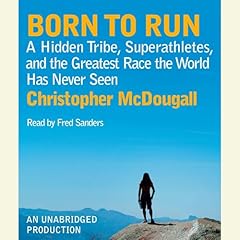
Good to Go
What the Athlete in All of Us Can Learn from the Strange Science of Recovery
No se pudo agregar al carrito
Add to Cart failed.
Error al Agregar a Lista de Deseos.
Error al eliminar de la lista de deseos.
Error al añadir a tu biblioteca
Error al seguir el podcast
Error al dejar de seguir el podcast
 Exclusivo para miembros Prime: ¿Nuevo en Audible? Obtén 2 audiolibros gratis con tu prueba.
Exclusivo para miembros Prime: ¿Nuevo en Audible? Obtén 2 audiolibros gratis con tu prueba.Compra ahora por $19.10
-
Narrado por:
-
Allyson Ryan
An eye-opening, myth-busting exploration of how the human body can best recover and adapt to sports and fitness training
In recent years "recovery" has become a sports and fitness buzzword. Anyone who works out or competes at any level is bombarded with the latest recovery products and services: from drinks and shakes to compression sleeves, foam rollers, electrical muscle stimulators, and sleep trackers.
In Good to Go, acclaimed FiveThirtyEight science writer Christie Aschwanden takes listeners on an entertaining and enlightening tour through this strange world. She investigates whether drinking Gatorade or beer after training helps or hinders performance, she examines the latest trends among athletes - from NFL star Tom Brady's infrared pajamas to gymnast Simone Biles' pneumatic compression boots to swimmer Michael Phelps' "cupping" ritual - and she tests some of the most controversial methods herself, including cryochambers, floatation tanks, and infrared saunas.
At a time when the latest recovery products and services promise so much, Good to Go seeks answers to the fundamental question: Do any of them actually help the body recover and achieve peak performance?
©2019 Christie Aschwanden (P)2019 HighBridge, a division of Recorded BooksLos oyentes también disfrutaron:




















A little bit of knowledge in a long listen
Se ha producido un error. Vuelve a intentarlo dentro de unos minutos.
I'll save you some time:
Se ha producido un error. Vuelve a intentarlo dentro de unos minutos.
Ultimately it’s all subjective feel and if you think and believe it helps, then it does - for most items.
Subjective Feel is best
Se ha producido un error. Vuelve a intentarlo dentro de unos minutos.
However, we’ve missed any address of evolution in sport and recovery, and some studies she cites seem to contradict her point with others: studies lacking good protocols should be ignored. At one point she noted a study, in support of her point, of west coast to east coast NFL travel and a team’s ability to cover the gambling spread. This seems to ignore gambling metrics evolving in forty years, sports teams travel improvements to gain more rest, and other factors. Yet, the author denigrates studies with similar flaw in an effort to prove her hypothesis.
If you read the book, avoid the audio: it’s a sometimes confusing listen, especially when the reader badly mispronounces several names. Oof.
I had hopes of learning more about sport and recovery advances. I must be one of the many folks duped by such silliness.
Love the Idea of the Book
Se ha producido un error. Vuelve a intentarlo dentro de unos minutos.
If you like debunking things this book is great. But it hasn’t helped me and only made me more confused.
I am going to try to listen to my body more to see what happens.
Listen to your body
Se ha producido un error. Vuelve a intentarlo dentro de unos minutos.


